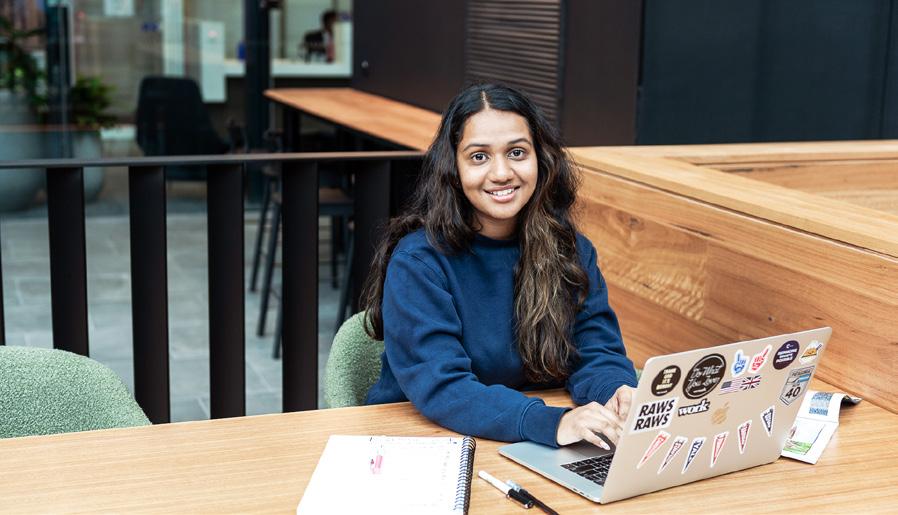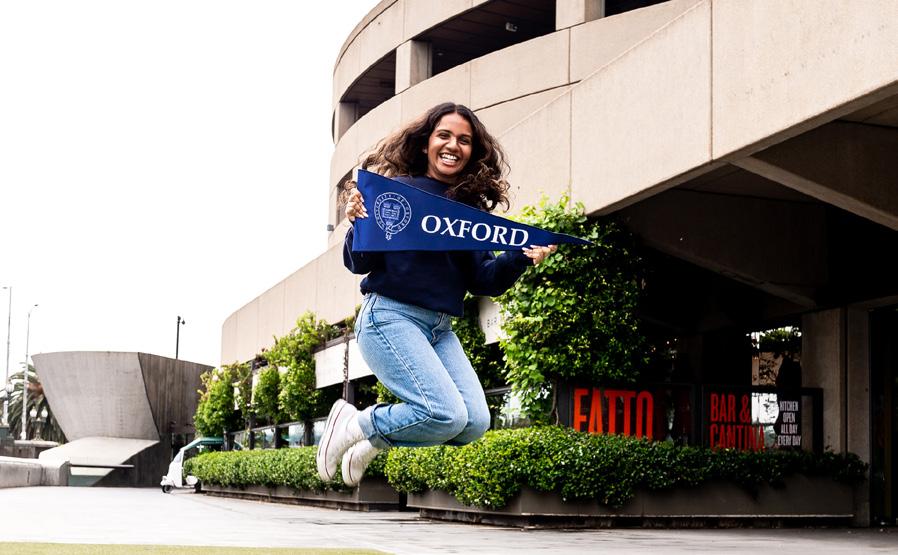
3 minute read
Sandhya
Effort, strategy and attitude: a toolkit for navigating uncertainty
“The only thing we know for certain about the future is that it will be different from the present.”
COVID-19 has made this adage from Peter Drucker , an American businessman, author and educator, more relevant than ever.
Sandhya, a future student at the University of Oxford and former Kumon student, says her Kumon Mathematics studies helped to ready her for the uncertainty she will face in her future.
Sandhya has been accepted into Oxford to study an undergraduate degree in philosophy, politics and economics.
Despite the obvious uncertainty regarding her near future plans, Sandhya remains cautiously optimistic. She believes she can adapt to a rapidly changing situation. Sandhya says her Kumon Mathematics studies played a key role in building her readiness to navigate uncertainty.
Sandhya says Kumon showed her the value of always putting in her best effort. This was key for her successful admission into Oxford, she says, and will continue to serve her well throughout her university studies, as well as afterwards.
“The little bit of study required each day by Kumon helped me to develop discipline, independence, confidence and resilience,” Sandhya says. “I was also encouraged in Kumon to continually set goals and to push my limits.”
“Kumon showed me the value of persistence and repetition from a young age.”
Self-learning, the set of skills and capabilities that allow one to pursue learning independently and to acquire new knowledge without having to rely on a teacher, will be invaluable for Sandhya’s future. Self-learning provides Sandhya the capability and strategies for on acquiring and applying new knowledge.
“The worksheets allow you to gradually build up enough knowledge before you move onto the set of problems,” Sandhya says. “The examples in the worksheets also give you enough information to self-learn; they give you the tools to work out the problems on your own.”
“Kumon students are used to being able to tackle, new and unfamiliar problems.”
By applying enough effort to progress through Kumon and to build her self-learning ability, Sandhya began to study advanced
Kumon Mathematics worksheets ahead of her school grade level. As Sandhya independently solved the advanced problems in the worksheets, her confidence in her own abilities grew.
This confidence created a positive loop whereby Sandhya was motivated to continue her efforts. This led Sandhya to further progress through Kumon and to further develop her self-learning ability.
“Through the process of advancing through Kumon, children … accumulate the experience and know-how for self-learning,” explained Toru Kumon, Kumon’s late founder in a series of lectures delivered in the 1990s.
“[This] will help children develop the ability solve problems by themselves and is essential for opening a child’s future.”
According to Professor Andrew Martin, an educational psychologist from the University of New South Wales, learning methods that draw students’ attention to the impact of their own individual efforts, strategies and attitude on their own performance are the most helpful in preparing pupils to navigate uncertainty.
“[Due to current events], it is likely that many students will feel little or no control over their learning,” Professor Martin wrote in a briefing paper from the Media Centre for Education Research Australia. “Research has found that when students feel little or no control, they are at risk of disengagement. [They ask themselves], ‘Why bother trying when you have no control over events?’”
“It is thus important to draw students’ attention to three big things they can control: effort, how hard they try; strategy, the way they try to go about their learning; and attitude, what they think of themselves, the task, their situation,” Professor Martin continued.
“The more students focus on these three things, the more empowered they will feel and behave through this time of major uncertainty.”
For Sandhya, the right level of practice and repetition that she experienced through Kumon showed her the power of effort in realising her goals. The development of self-learning gave her lifelong strategies for acquiring and applying new knowledge. Being an advanced Kumon student who studied boosted Sandhya’s confidence to a level that contributed to her attitude – an attitude conducive for navigating uncertainty.

1 Peter F. Drucker, Management: Tasks, Responsibilities, Practices, New York: Harper & Row, 1973
2 Media Centre for Educational Research. (2020) Briefing Paper #01: Education and Covid-19





